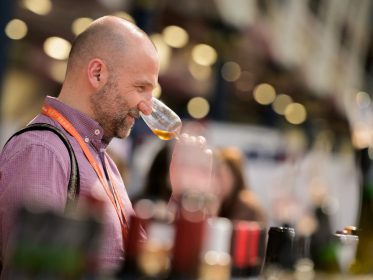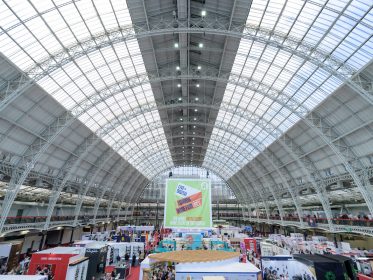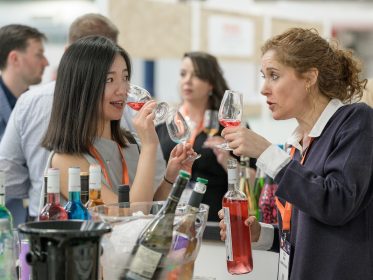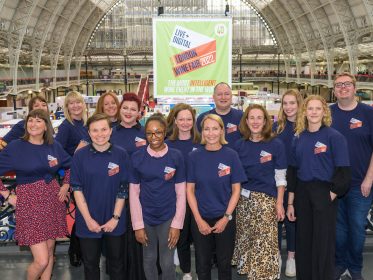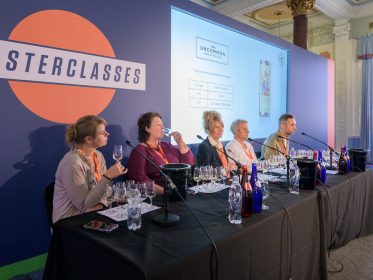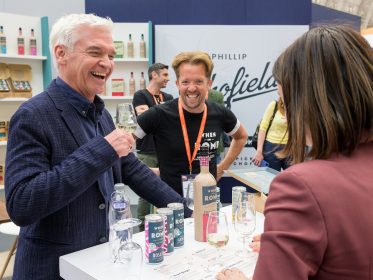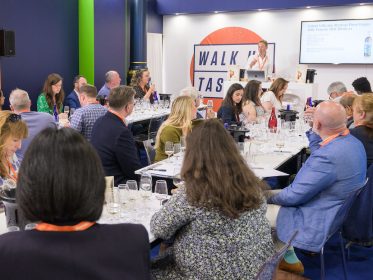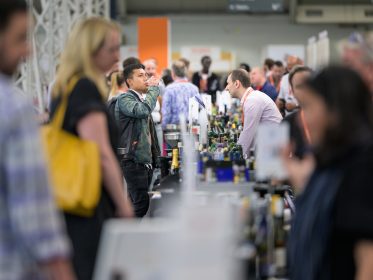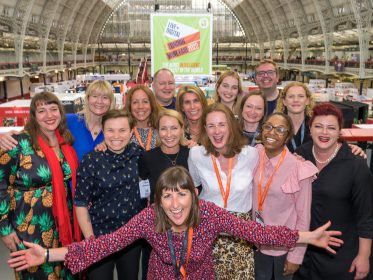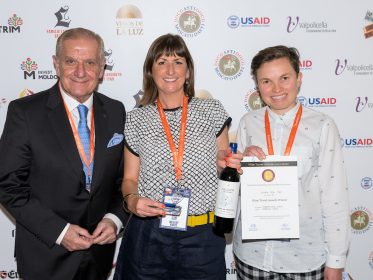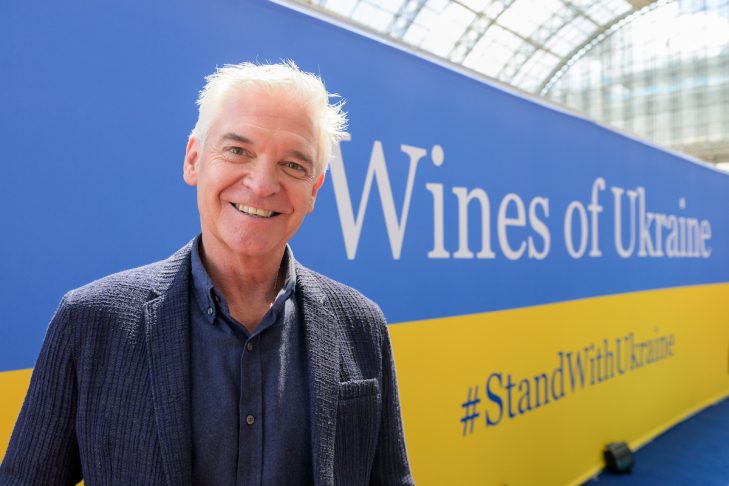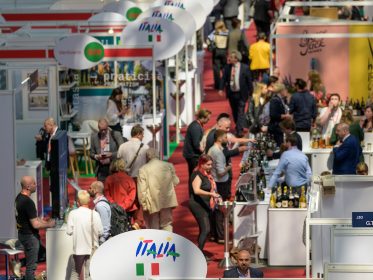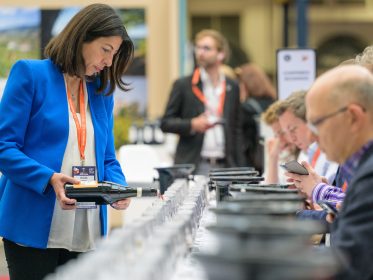Hannah Tovey: “For many producers London is seen as “the shop window to the world”; it’s where the most exciting emerging regions rub shoulders with the greatest bottles on earth”
The London Wine Fair, a WTA winner in the category “Effective event”, became a platform for the first Wine Travel Awards Ceremony where our community was largely represented and the winners of the 2021-2022 edition awarded. Now we are gladly sharing this interview with Hannah Tovey, head of the London Wine Fair, where she talks about the achievements of this year’s exhibition, new exhibitors, the development and transformation of the exhibition business and more.
Hannah, let us cite you as saying on the last day of this year’s exhibition that within 15 years of work you saw such a forum for the first time. What are the most significant features that distinguish this year – well, apart from the fact that it was the anniversary (40th!) release (figuratively speaking) of the London Wine Fair? We would like to take this opportunity to extend our greetings to your team, once again, on the occasion of such an anniversary!
“That’s a really good question! By the end of day three it was clear that the show had had a far greater significance than even we had anticipated. It represented the “back to normal” that the wine industry had been craving over the last two and a half years and the buzz from our exhibitors and visitors was palpable. Our 40th live event was representative of everything that The Fair is; a platform for the UK and international wine trade to do business, reflecting the trends and the issues that shape our industry.”
Speaking of differences, we would like to ask you what the most important particularity of the LWF is compared to other professional exhibitions in the wine world?
“The London Wine Fair takes place in the heart of what is the most exciting city in the world when it comes to wine. For many producers London is seen as “the shop window to the world”; it’s where the most exciting emerging regions rub shoulders with the greatest bottles on earth. The London Wine Fair both serves and delivers for this industry and is always at the forefront of global trends.
“The Fair has always delivered an unrivalled programme of debates, briefings, masterclasses and seminars, reflecting our core values of education and knowledge.”
The UK market has always been considered to be a fashionable podium for the wine trade – and wines were sent here from all over the world for quality tasting. After all, it so happened that Great Britain gave to the world some of the best wine critics, professional media, the most professional buyers and importers, exemplary operators of the wine trade. And, of course, a high-quality exhibition hub, where all these vectors converge. Does Britain maintain this reputation even now, given the lapse of time and changing trends, given, for instance, Brexit?
“There is no doubt that Brexit has caused barriers to the wider trade within the EU across industries and wine is no different. The WSTA (Wine & Spirit Trade Association) and its members have worked tirelessly to lobby for simplified taxation and reduced red tape and we hope this can be achieved. We have provided a platform for debating the impact of Brexit over the last few years and will continue to do so.”
Over the past two years, all of the world’s expo hubs have experienced lockdowns caused by the pandemic. We know it was not an easy path for all of you. What exactly did the LWF organizers draw from this period of trial? What forms of activities, new expositions and formats have arisen in view of this period in human history?
“The Pandemic represented a huge challenge for event organisers, and we were no exception. Lockdown was announced some two months before the 2020 show, which led to its almost immediate cancellation. We were in regular contact with our exhibitors from the outset and made the decision to offer them the choice between a full refund, using their credit to pay to participate in our innovative digital event, or rolling over their monies to the following year. There was no holding our exhibitors to ransom, and we felt this was the right thing to do in what was an unprecedented situation.
“We were the first drinks exhibition of our scale to switch to a digital event, which replaced the live event in 2021. 2,608 visitors attended, 25,000 samples were dispatched in advance and the masterclass sessions were streamed over 6,000 times. It was so successful, we decided to incorporate digital into 2022, to create the first hybrid London Wine Fair.”
Can you kindly assess, which of them are efficient and may in the future become a sign of progress, and which are artificial and were introduced only due to the event of Force Majeure (because, for example, such formats as online tastings lose the atmosphere, at the very minimum, not to mention possible deviations in organoleptics due to bottle logistics or various glass shapes)?
“Digital format is here to stay albeit a format that is continuously evolving at high speeds. Whilst the influx of tastings and meetings over Zoom and Teams may have left us craving some “in-person” time, the reality is that digital is an incredibly useful tool – as long as it’s done well – especially for those unable to travel.”
Did new exhibitors appear this year – outstanding winemakers, regions, which were unknown before now, new associations?
“Yes, we had a number of first-time exhibitors this year, as well as several who returned after a break of a few years. Wines of Ukraine was the most notable new exhibitor, and we were very proud to have been able to assist them this year. This was only possible with the help and support of Drinks+. We also welcomed a new-to-market collective of producers from Portugal’s Península de Setúbal for the first time. ProChile returned, as did Wine Australia, with several wineries from Wine Victoria and South Australia attending. Bibendum, a major UK agent, returned after a break of a few years.”
On the eve of the pandemic, there was a trend towards globalization and consolidation, especially in wine marketing. What is happening in the world market now: has the trend changed? Perhaps it turned out that it is easier or more interesting for winemakers to advance individually?
“There is always an ebb and flow when it comes to generic bodies as producers may elect to exhibit with the generic whilst they are seeking distribution, but then move to their agent stand once they are more established. The breadth of exhibitors at this year’s event was very evident, with many emerging regions electing to exhibit as a generic body, such as: Uzbekistan, Greece, and India, to name a few.”
If we are not mistaken, the London Wine Fair has always been about trade marketing. But this year you accepted the offer of the Communication Media Group Drinks+ and became the Exhibition Partner of the Wine Travel Awards (we are grateful for the trust in this new project and such strong support, including yours personally). How, according to your observations, can wine tourism influence the development of winemaking in general? After all, there are some studies that prove their direct dependence. For example, the influence of the size of a winery on the share of income from tourism: the smaller the production, the larger the share is. But we also know examples when museums or restaurants with tasting rooms, with sufficiently powerful productions, bring significant profits, competing with sales through traditional sales channels.
“There is no doubt that wine tourism adds another dimension to wine brands. That sense of place that we all talk about when marketing and selling wine, is brought to life when consumers are able to actually visit. Experiencing the romance of a brand first hand creates engagement which translates into valuable long-term brand loyalty.”
Does London, which is prone to such futuristic formats, plan to create a wine museum like the Cité du Vin in Bordeaux or the other one opened in Burgundy?
“In fact, a wine museum – Vinopolis – opened in London back in 1999, and whilst it was largely successful, it closed in 2015. As far as I know, there are no current plans to re-open this type of venue. Bordeaux and Burgundy may be more logical locations for a wine museum – particularly Bordeaux which is already set up for wine tourism. I suppose it’s worth considering that London is home to hundreds of museums, and is a much more competitive location in that regard.”
Will the London Wine Fair, as a very convenient platform for such purposes, continue to develop analytical activities to monitor the market trends?
“We have always been a platform for market analysts to present their findings and foresight, and feel that these elements of the show are always incredibly valuable for our audience. The exhibitor list platform that we use, Bottlebooks, also provides us with highly insightful data based on the tens of thousands of searches made by our exhibitors and visitors each year.”
Perhaps you are planning to launch educational programs or events in the near future? If it’s not a secret, what news are you preparing for next year?
“We have partnered with the W.S.E.T. (Wine & Spirit Education Trust) for several years. They have been successfully supporting our Education Zone at the Fair as headline sponsors, with a programme of seminars and tastings tailored to the different levels of wine knowledge. We also provide a new format for our Discovery Zone each year, with a new headline partner in order to ensure we remain ahead of the curve. It’s all about future-proofing the industry to our best effect.”
At the end of the conversation, we want to extend our gratitude to the London Wine Fair on behalf of the entire wine industry of Ukraine for the unique assistance rendered to our winemakers who are suffering from the Russian aggression: for a free opportunity to present Ukrainian wines for the first time this year at the unified national Wines of Ukraine stand. And not only for the stand itself – incidentally, deployed in a wonderful location in the very centre of the exhibition – but also for the assistance in organizing volunteer sommeliers of the highest professional level, who helped us to present the Ukrainian drinks to numerous guests of the stand. The memory of your support will remain in our hearts forever!
“We were absolutely delighted to be able to help and we were so pleased to see how positively the wines were received by the UK wine trade. We wish Wines of Ukraine every success in the future – they so deserve this. I also cannot stress enough that it was the support of Drinks+ that created this opportunity and enabled the producers to get their wines here. Thank you to the whole team. We will never forget your hard work and kindness during this important collaboration.”
Author: Olga Pinevich-Todoriuk
